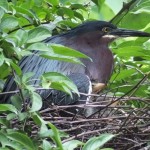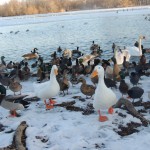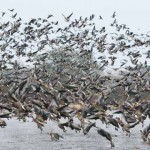
Wood duck mother and duckling
Something is going on with nests in Prospect Park this season. They’re everywhere. You can’t walk 50 feet in the park bumping into some adorable tableau of chirping baby birds. Half the trees in the park seem to be brimming with exhibitionist robin families. The big unusual nests this year are green herons and wood ducks (which are living somewhere near dog beach–but where they nested, I don’t know.)
Green herons are nesting on the lullwater and near the less-fancy bridge by the boathouse.
Green heron on nest by the boathouse. Babies are tucked under her wing.
Green heron feeds her creepy-looking babies.
Swans in the park, as if in defiance of a potential plan to wipe them out, are multiplying. They have two nests, one helpfully placed on an island by the ice rink to make for easy viewing.
The father swan normally spends his days chasing off other waterfowl, but he came and sat on the eggs with his wife. Apparently he was alarmed by a mommy mallard and her ducklings nearby.
Baby Swans
I havent’ seen barn swallows build nests on the boathouse yet, just in the tunnels.
Barn swallow nest
These robins are so desperate for attention they build nests at eye level, sometimes
Keep reading Nest Quest in Prospect Park




Recent Comments